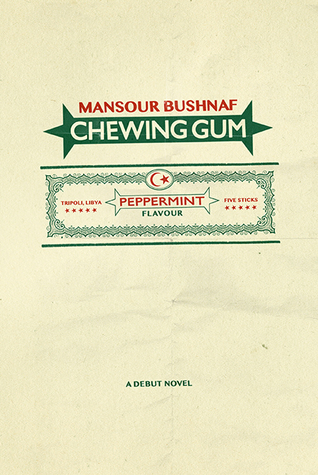 I received a paperback copy of this book from Publishing Push and DARF Publishers in exchange for an honest review.
I received a paperback copy of this book from Publishing Push and DARF Publishers in exchange for an honest review.
Young Mukhtar is frozen in time, gazing at his beloved Fatma as she disappears into the streets of Tripoli. Around these young lovers, Bushnaf weaves a compelling network of images: a litter-strewn park, a bewitching Italian statue and a fluttering red scarf. Through these images, imbued with social, historical and existential import, Bushnaf paints a dark portrait of a country in crisis and an individual alone at the centre of conflicting ideologies, all attempting to explain his existence away.
Chewing Gum provides a satirical and semi-journalistic style look into life beneath a repressive dictatorship. Bushnaf fills this novel with first-hand experience that creates a rich and harsh reality within the pages, contrastingly written in such a poetic style that the brutality hits even harder, passages lingering even after you have set the book down. I will say that this book does discuss some hard hitting topics and subjects that may not be suitable for younger readers, such as prostitution, sex, assault and masturbation, but none are discussed in any way that seems to excuse the characters’ actions, neither does it present these topics in a graphic way.
As someone who knows very little about politics and as someone who previously knew very little about most African countries, at first I found this novel slightly confusing because I feel the author sometimes assumes that the reader would know about these things but I wouldn’t let that put you off picking this book up at all. After the first few chapters everything started to make a lot more sense; this is mostly down to Mansour Bushnaf’s amazing way of painting a picture of the country in which this book is set.
With some translated fiction I have read, the writing seems stilted and does not flow in a natural and organic way; that is not the case with this. The writing style is simple enough to understand easily but has a perfect balance between lyrical and realistic. With an omniscient first-person plural narrator, the story seems to be told through the reader’s eyes, calling Mukhtar ‘our hero’. This unusual choice of tense really lends itself well to the story being told and makes you feel a lot more involved in the story taking place.
The short, vignette-like, chapters feel almost like interconnected short stories rather than one novel yet the links individual threads of storyline into one cohesive plot. Sometimes at just 3 pages, these titled chapters seem to fly by whilst reading and yet they really pack a punch with their powerful and emotive language.
My only complaint would be that I found the ending a bit confusing but that may be down to my own ignorances when it comes to philosophy; it’s not that I don’t know anything about philosophy, I just think that this book explores a lot of different philosophical ideas, not all of which I could grasp with this first reading. However, I think that this book would definitely benefit from rereading.
Overall I would definitely recommend this novel. The amount of philosophical ideas, imagery and metaphor throughout the book really make me wish that this book was chosen by universities to study. It’s inclusion of Libyan politics and culture was fascinating and I am so glad that I read it and that Bushnaf’s work is now available to read!



